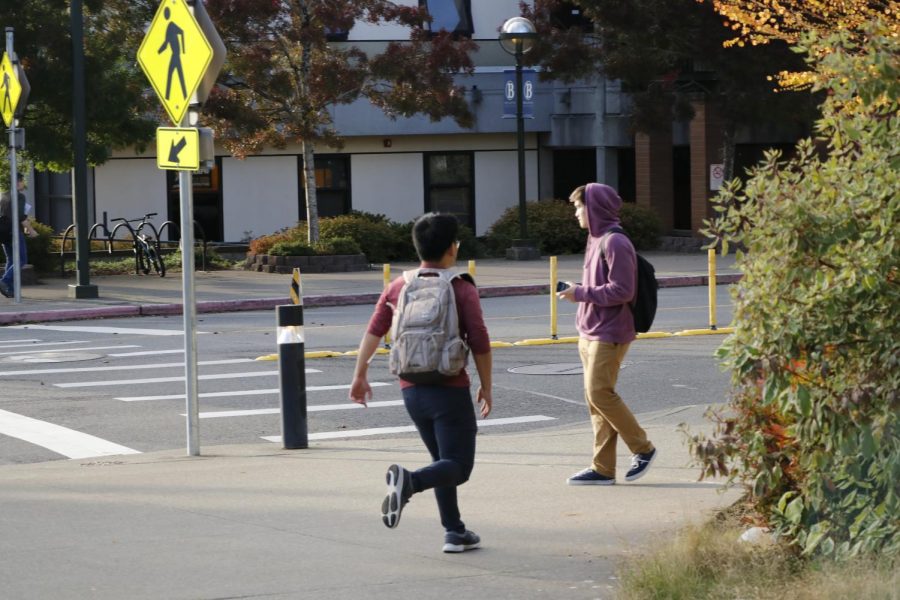Controversy over Graduation Honors Recognition
TAKING THEIR FUTURES INTO THEIR OWN HANDS Issaquah students taking Running Start classes at Bellevue College walk to their next class. Many current Issaquah High School students fear that without recognition for honors classes, clubs, and sports, they will seem less impressive to colleges. Freshman Ian Campbell said, “I participate in honors classes so I have my best chance of getting into college, and coming into it I expected to be recognized for it.”
October 1, 2019
The newest outrage among Issaquah students and parents is the Issaquah High School graduation committee’s decision on graduation honors recognition. On Aug. 5, a school newsletter email announced that students graduating in 2020 and thereafter will not be permitted to wear honor stoles or cords at graduation for accomplishments in GPA, clubs, or sports. This has been a tradition at Issaquah High since its opening. So why has the committee canceled it from here on out? Junior Grace Cavotta said the cause was “complaining parents,” whereas sophomore Sophia Hashmey said that “students were being put under stress and pressure to get these honor cords and stoles.” To her, the stoles and cords are just a visual representation to flaunt students’ individual achievements. “It’s just for pictures and videos; it’s just for show.” However, others, including freshman Ian Campbell, said it represents the dedication of Issaquah students.
According to the committee, “Despite our best efforts to ensure that all students felt honored and recognized at graduation for their various achievements we came to realize that the addition of the various cords and stoles created added feelings of pressure and stress for our students instead of feelings of celebration and pride.”
According to Cavotta, “People who work hard deserve to be recognized. People who slack off and didn’t care until they realize they’re not going to have any adornments at graduation don’t deserve to be ‘equal’ to those who really put in effort and sacrificed their free time to do well in school.” However, Hashmey disagrees. She believes that students should be focusing on other things at graduation, rather than stressing out about it. “Everyone should be happy while celebrating. It’s a celebration!” Hashmey said.
By “pressure and stress,” the committee is referring to students’ and parents’ behavior concerning honors recognition. Principle Andrea McCormick gave a list of the student and parent misconducts:
- Parents/students asking teachers from past years for grade changes for their lowest grades, thereby improving their chances of receiving a cord/stole
- Parents asking teachers to change grades because their children are having mental health issues because they feel less appreciated than their peers who earned a cord/stole
- Parents/students verbally abusing the secretary that hands out the cords/stoles because the students did not receive one
- Students buying fake cords/stoles and wearing them, and other students feeling the school was not doing enough to stop this
- Parents/students wanting additional stoles/cords for additional achievements
- Parent/students asking for cords/stoles for family hardships because they think that having resilience is as impressive as a high GPA or participation in a club or sport
- Parents/students wanting cords for partial participation in a club/sport despite non-completion
A large chunk of Issaquah students are in honors classes, clubs, and/or sports – but for different reasons. Campbell said he is in honors classes to further his education: “I want my best chance of getting into college.” Senior Andrew Bayles is in many clubs because he is passionate about them and they are important to him. Cavotta participates in several clubs, honor classes and sports and feels that while “it doesn’t really matter to colleges, it’s still nice to be recognized.”
“We have school-wide, grade level, club specific and sports-specific recognition ceremonies all year including one for seniors that is open to all who wish to attend,” McCormick said, in response to parents’ and students’ complaints. Students will also still be able to decorate caps. According to the committee, students can still celebrate their achievements and individuality.
However, that does not seem to be enough for many parents and students. Parents are flooding Facebook, expressing their opposition to the committee’s decision. Issaquah families have started an online petition to bring the honors recognition back. When asked what he thinks the majority of students’ and parents’ reactions were, Bayles said, “It’s a negative reaction. People want [cords and stoles] back. I think it’s a reasonable reaction.”
It is not just Issaquah families that have taken an interest on this controversy. Local news networks, including KIRO 4, have made their opinions clear, calling the decision “pathetic” and “just insanity.” A conservative newscast, KIRO News thinks that the decision reflects America’s current political system. Radio personality Dori Monson of KIRO News has this to say: “We see this all throughout the Democratic debates. It’s in the Green New Deal — we’ll provide a basic income for people unwilling to work. We’ll tax the person who works really hard and give you their money. It might make you feel bad that the hardest workers have more in life than you, so it’s necessary to even the score.” Bayles agreed that it is a liberal idea, whereas Cavotta said it is “a stretch to say it has anything to do with politics. It’s really just parents complaining.”
Overall, students have mixed feelings about the new rule. Bayles said he is “against it because there should be recognition for people who have done the hard work, put in hundreds of hours into community work, and spent lots of time in their clubs. They deserve recognition. But I also understand why they did it. I can’t really think of a better solution.” Cavotta is also against it. “I mean, it’s better than when anyone could get a cord,” she says, “but it’s still bad. It’s not fair. We should be able to show our accomplishments.” Hashmey said, “it’s the best action they could have taken under the circumstances. I can’t think of a better solution.” Campbell is against it saying, “The school has basically taken away all motive for students to take honors classes. I mean, it’s a small percentage of people ruining it for everyone else. Just ignore them.”
Luckily, in the fall, the graduation committee and McCormick will take it to the students. They plan to meet with seniors to try to devise a significant graduation program that students and parents can be satisfied with. Bayles does not think the school has given students the chance to speak yet, noting that “I haven’t gotten a survey or anything like that.” Hashmey strongly believes students should have a say, stating that “[the graduation committee] is doing it for the students. There should be voting. If it has anything to do with the students, the committee should ask them.” In the end, it is about the students, and it is the schools’ responsibility to take their opinion into account.



